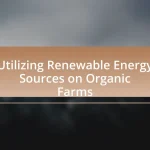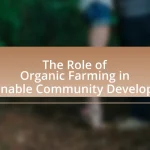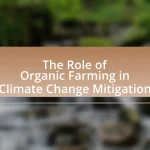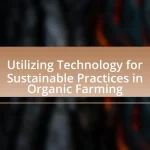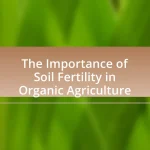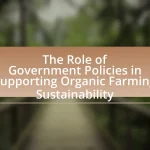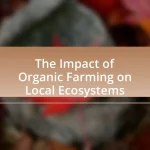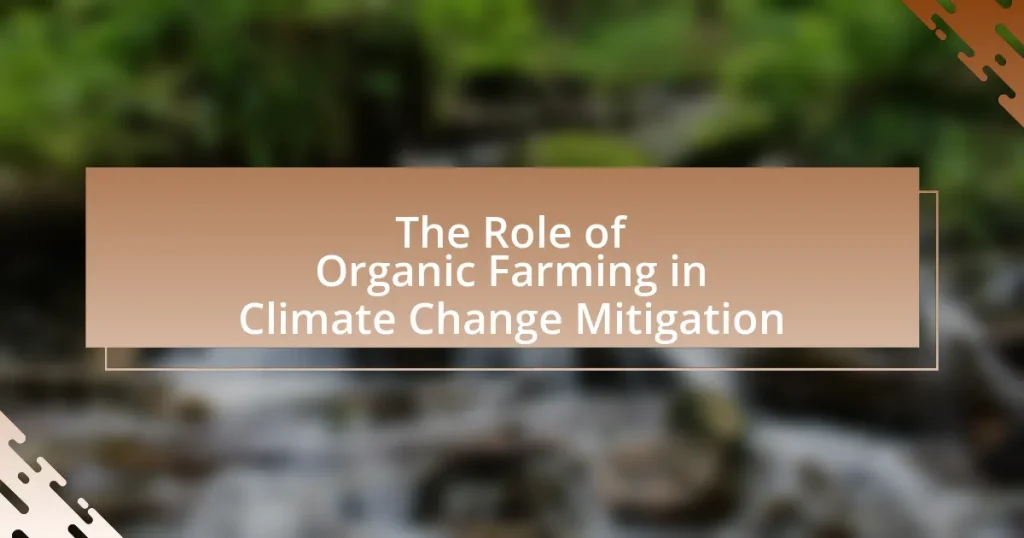Organic farming is a sustainable agricultural practice that significantly contributes to climate change mitigation by enhancing soil health, reducing greenhouse gas emissions, and promoting biodiversity. This article explores how organic farming techniques, such as crop rotation, cover cropping, and reduced tillage, improve carbon sequestration and lower emissions compared to conventional methods. It also addresses the ecological benefits of organic farming, including increased biodiversity and improved water quality, while discussing the challenges and economic factors influencing its adoption. Furthermore, the article highlights the importance of education, consumer demand, and policy support in promoting organic farming as a viable strategy for addressing climate change.
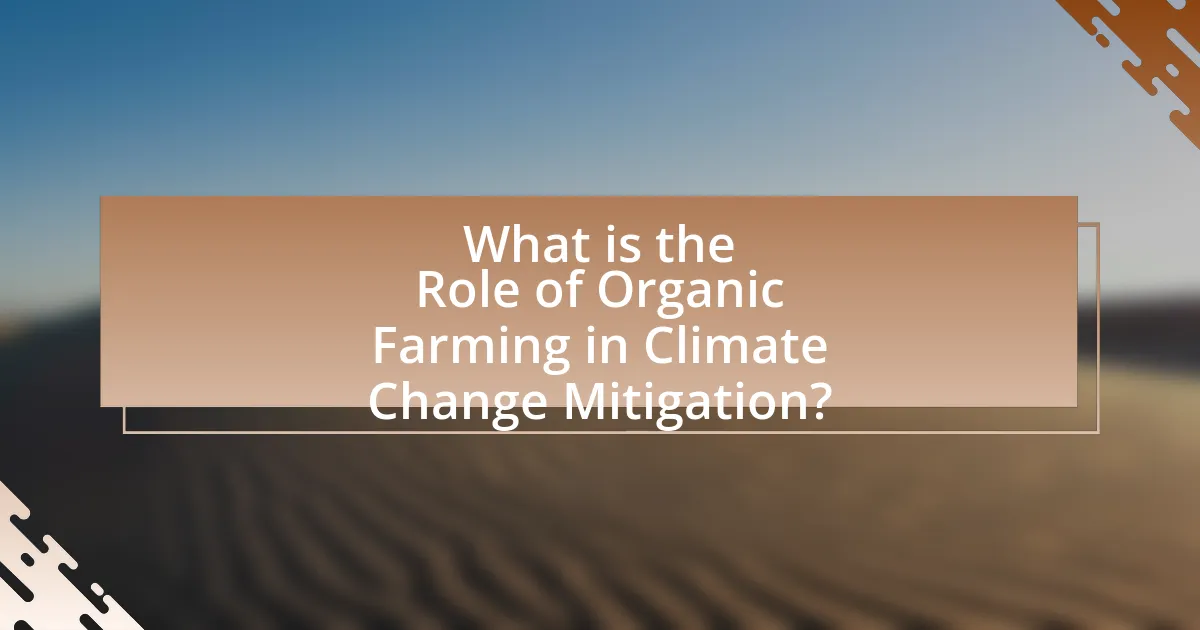
What is the Role of Organic Farming in Climate Change Mitigation?
Organic farming plays a significant role in climate change mitigation by enhancing soil health, reducing greenhouse gas emissions, and promoting biodiversity. This agricultural practice utilizes natural inputs and methods, which can lead to increased carbon sequestration in soils; studies indicate that organic soils can store up to 30% more carbon than conventional soils. Additionally, organic farming reduces reliance on synthetic fertilizers and pesticides, which are major contributors to nitrous oxide emissions, a potent greenhouse gas. Research published in the journal “Nature” highlights that organic farming can lower overall emissions by 40% compared to conventional methods. Furthermore, organic practices encourage crop diversity, which can enhance ecosystem resilience and adaptability to climate change impacts.
How does organic farming contribute to reducing greenhouse gas emissions?
Organic farming contributes to reducing greenhouse gas emissions primarily by enhancing soil health and promoting biodiversity. This agricultural practice avoids synthetic fertilizers and pesticides, which are significant sources of nitrous oxide emissions, a potent greenhouse gas. Instead, organic farming relies on natural inputs like compost and cover crops, which improve soil carbon sequestration. Research indicates that organic soils can store up to 30% more carbon than conventional soils, effectively reducing atmospheric CO2 levels. Additionally, organic farming practices, such as crop rotation and reduced tillage, further minimize soil disturbance, leading to lower emissions from soil degradation.
What practices in organic farming help lower carbon footprints?
Practices in organic farming that help lower carbon footprints include crop rotation, cover cropping, and reduced tillage. Crop rotation enhances soil health and biodiversity, which can lead to increased carbon sequestration in the soil. Cover cropping prevents soil erosion and improves soil organic matter, further contributing to carbon storage. Reduced tillage minimizes soil disturbance, preserving soil structure and reducing carbon release into the atmosphere. According to a study published in the journal “Agriculture, Ecosystems & Environment,” organic farming practices can sequester up to 1.5 billion tons of carbon dioxide annually, demonstrating their effectiveness in mitigating climate change.
How does soil health in organic farming impact carbon sequestration?
Soil health in organic farming significantly enhances carbon sequestration by improving soil structure, increasing organic matter, and promoting microbial activity. Healthy soils, rich in organic matter, can store more carbon as they facilitate the formation of stable soil aggregates, which protect carbon from decomposition. Research indicates that organic farming practices, such as cover cropping and reduced tillage, can increase soil organic carbon levels by 20-30% compared to conventional farming methods. This increase in soil organic carbon not only mitigates climate change by sequestering atmospheric CO2 but also improves soil fertility and resilience.
Why is organic farming considered sustainable in the context of climate change?
Organic farming is considered sustainable in the context of climate change because it enhances soil health, reduces greenhouse gas emissions, and promotes biodiversity. By utilizing practices such as crop rotation, cover cropping, and organic fertilizers, organic farming improves soil structure and fertility, which can sequester carbon and mitigate climate change effects. Research indicates that organic farming systems can reduce nitrous oxide emissions by up to 40% compared to conventional methods, as they avoid synthetic fertilizers that contribute to these emissions. Additionally, organic farms often support diverse ecosystems, which can increase resilience to climate impacts and enhance carbon storage in agricultural landscapes.
What are the ecological benefits of organic farming?
Organic farming provides significant ecological benefits, including enhanced biodiversity, improved soil health, and reduced pollution. By avoiding synthetic pesticides and fertilizers, organic farming promotes a diverse ecosystem, which supports various plant and animal species. Research indicates that organic farms can harbor up to 30% more biodiversity compared to conventional farms. Additionally, organic practices such as crop rotation and cover cropping improve soil structure and fertility, leading to better water retention and reduced erosion. A study published in the journal “Nature” found that organic farming can sequester more carbon in the soil, contributing to climate change mitigation. Furthermore, organic farming minimizes water pollution by reducing runoff of harmful chemicals, thereby protecting aquatic ecosystems.
How does organic farming promote biodiversity and its relevance to climate resilience?
Organic farming promotes biodiversity by utilizing practices that enhance ecosystem health, such as crop rotation, intercropping, and the use of organic fertilizers, which support a diverse range of species. These practices create habitats for beneficial insects, birds, and soil organisms, leading to increased genetic diversity and resilience in agricultural systems. Research indicates that organic farms typically host 30% more species than conventional farms, contributing to a more balanced ecosystem. This biodiversity is crucial for climate resilience as it enhances ecosystem services like pollination, pest control, and soil fertility, which are vital for adapting to climate variability and extreme weather events. Studies show that diverse ecosystems are better equipped to withstand climate stressors, making organic farming a key strategy in mitigating the impacts of climate change.
What challenges does organic farming face in climate change mitigation?
Organic farming faces significant challenges in climate change mitigation, primarily due to limited scalability and resource constraints. The reliance on organic practices often results in lower yields compared to conventional farming, which can hinder food production needed to meet global demands while reducing greenhouse gas emissions. Additionally, organic farmers frequently encounter difficulties in accessing organic inputs, such as fertilizers and pest control methods, which can be less effective and more expensive. Research indicates that organic farming systems may require more land to produce the same amount of food as conventional systems, potentially leading to deforestation and habitat loss, which further exacerbates climate change. Furthermore, organic farming’s dependency on crop rotation and biodiversity can be disrupted by extreme weather events, making it harder to maintain sustainable practices.
How do economic factors influence the adoption of organic farming practices?
Economic factors significantly influence the adoption of organic farming practices by affecting the cost of inputs, market demand, and potential profitability. For instance, higher initial costs for organic seeds and certification can deter farmers from transitioning to organic methods. However, as consumer demand for organic products increases, driven by health and environmental concerns, farmers may find greater financial incentives to adopt organic practices. Research indicates that organic farming can yield higher prices for produce, with organic products often selling at a premium of 20-100% over conventional goods, thus enhancing profitability. Additionally, government subsidies and financial support for organic farming can further encourage adoption by offsetting costs and reducing financial risks associated with the transition.
What are the limitations of organic farming in addressing climate change?
Organic farming has limitations in addressing climate change primarily due to lower yields compared to conventional farming methods. Research indicates that organic farms can produce 20-30% less food per acre, which can lead to increased land use and deforestation to meet food demands, thereby exacerbating greenhouse gas emissions. Additionally, organic farming often relies on natural fertilizers, which can release nitrous oxide, a potent greenhouse gas, during decomposition. Furthermore, the transition to organic practices can take several years, delaying immediate climate benefits. These factors collectively hinder the effectiveness of organic farming as a comprehensive solution to climate change.
How can organic farming practices be improved for better climate outcomes?
Organic farming practices can be improved for better climate outcomes by enhancing soil health through crop rotation, cover cropping, and reduced tillage. These methods increase soil organic matter, which enhances carbon sequestration and reduces greenhouse gas emissions. Research indicates that practices like cover cropping can increase soil carbon levels by up to 1.5 tons per hectare annually, contributing significantly to climate mitigation efforts. Additionally, integrating agroforestry and permaculture principles can diversify production systems, improve biodiversity, and further enhance resilience against climate variability.
What innovations are emerging in organic farming to enhance sustainability?
Innovations emerging in organic farming to enhance sustainability include the use of precision agriculture technologies, cover cropping, and agroecological practices. Precision agriculture utilizes data analytics and sensor technology to optimize resource use, reducing waste and improving crop yields. Cover cropping enhances soil health by preventing erosion and increasing organic matter, which contributes to carbon sequestration. Agroecological practices, such as crop rotation and intercropping, promote biodiversity and resilience in farming systems. These innovations collectively support sustainable farming by minimizing environmental impact and improving resource efficiency, as evidenced by studies showing increased soil fertility and reduced chemical inputs in organic systems.
How can policy support the growth of organic farming in climate change mitigation?
Policy can support the growth of organic farming in climate change mitigation by providing financial incentives, regulatory frameworks, and educational resources. Financial incentives, such as subsidies for organic inputs and practices, encourage farmers to transition to organic methods, which enhance soil health and reduce greenhouse gas emissions. Regulatory frameworks can establish standards for organic certification, ensuring that practices align with climate goals. Additionally, educational resources can inform farmers about sustainable practices and technologies that improve resilience to climate impacts. For instance, a study by the Food and Agriculture Organization highlights that organic farming can sequester carbon in soil, thus contributing to climate change mitigation efforts.
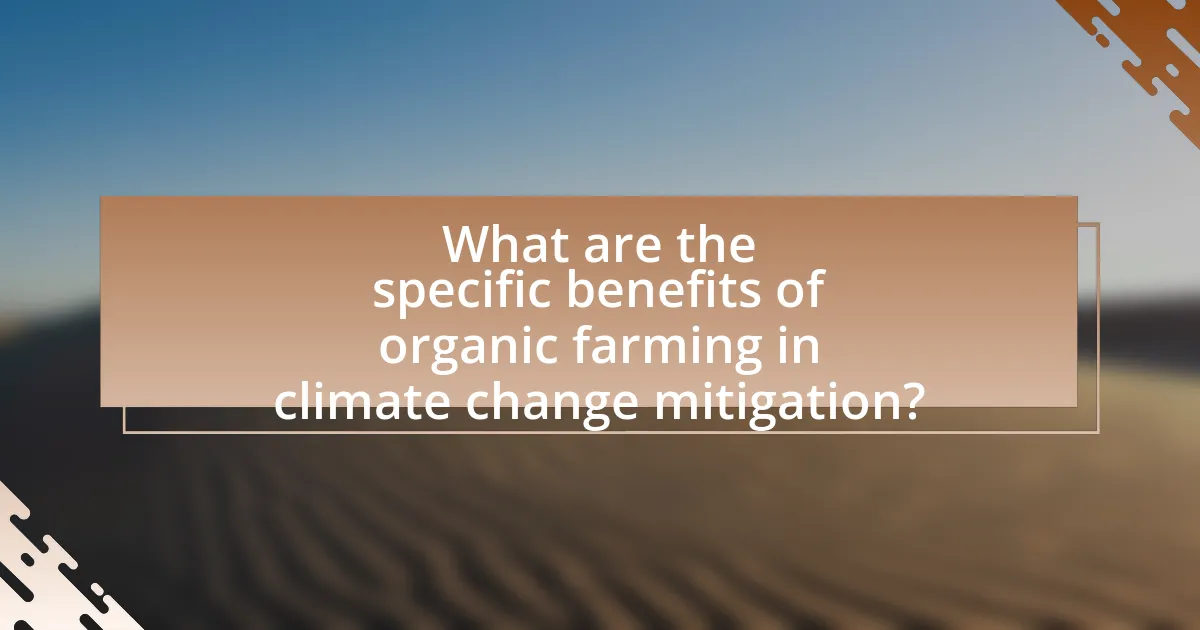
What are the specific benefits of organic farming in climate change mitigation?
Organic farming significantly contributes to climate change mitigation by enhancing soil health, reducing greenhouse gas emissions, and promoting biodiversity. Specifically, organic practices improve soil organic matter, which increases carbon sequestration; studies show that organic soils can store up to 30% more carbon than conventional soils. Additionally, organic farming typically avoids synthetic fertilizers and pesticides, which are major sources of nitrous oxide emissions, a potent greenhouse gas. Research indicates that organic farming can reduce overall emissions by 40% compared to conventional methods. Furthermore, organic systems foster diverse ecosystems, which can enhance resilience to climate impacts and support pollinator populations essential for food production.
How does organic farming improve soil health and its role in climate change?
Organic farming improves soil health by enhancing soil structure, increasing biodiversity, and promoting nutrient cycling. These practices lead to higher organic matter content, which improves water retention and reduces erosion. For instance, a study published in the journal “Agriculture, Ecosystems & Environment” found that organic farming can increase soil organic carbon levels by 30% compared to conventional methods. This increase in organic carbon not only enriches the soil but also plays a crucial role in climate change mitigation by sequestering carbon dioxide from the atmosphere. Thus, organic farming contributes to healthier soils and helps combat climate change through enhanced carbon storage.
What techniques in organic farming enhance soil carbon storage?
Techniques in organic farming that enhance soil carbon storage include cover cropping, reduced tillage, and compost application. Cover cropping introduces biomass that contributes organic matter to the soil, increasing carbon sequestration. Reduced tillage minimizes soil disturbance, preserving soil structure and organic carbon levels. Compost application enriches soil with organic matter, promoting microbial activity that further enhances carbon storage. Research indicates that these practices can significantly increase soil organic carbon levels, with studies showing that cover crops can increase soil carbon by up to 1.5 tons per hectare annually.
How does soil biodiversity contribute to climate resilience in organic farming?
Soil biodiversity enhances climate resilience in organic farming by improving soil health, nutrient cycling, and water retention. Diverse soil organisms, such as bacteria, fungi, and earthworms, contribute to the breakdown of organic matter, which enriches soil fertility and structure. This enriched soil can better withstand extreme weather events, such as droughts and heavy rainfall, by maintaining moisture levels and reducing erosion. Research indicates that farms with higher soil biodiversity can yield more stable crop production under varying climatic conditions, thereby supporting food security. For instance, a study published in “Nature” by Cardinale et al. (2012) found that ecosystems with greater biodiversity are more productive and resilient to environmental changes.
What role does organic farming play in water conservation?
Organic farming plays a significant role in water conservation by enhancing soil health and promoting efficient water use. This agricultural practice utilizes techniques such as crop rotation, cover cropping, and reduced tillage, which improve soil structure and increase its water retention capacity. Research indicates that organic soils can hold up to 20% more water than conventional soils, reducing the need for irrigation. Additionally, organic farming minimizes chemical runoff, protecting water quality in nearby ecosystems. These practices collectively contribute to sustainable water management, essential for mitigating the impacts of climate change.
How do organic farming practices reduce water usage compared to conventional methods?
Organic farming practices reduce water usage compared to conventional methods primarily through improved soil health and moisture retention. Organic farming emphasizes the use of cover crops, crop rotation, and organic matter, which enhance soil structure and increase its ability to retain water. Research indicates that organic soils can hold up to 20% more water than conventional soils, leading to reduced irrigation needs. Additionally, organic farming often employs techniques such as mulching and reduced tillage, which further minimize evaporation and runoff. These practices collectively contribute to a more sustainable water management system, demonstrating that organic farming can significantly lower water consumption in agricultural production.
What impact does organic farming have on water quality and ecosystem health?
Organic farming positively impacts water quality and ecosystem health by reducing chemical runoff and enhancing biodiversity. The absence of synthetic fertilizers and pesticides in organic farming minimizes the contamination of water bodies, leading to cleaner water sources. Research indicates that organic farming practices, such as crop rotation and cover cropping, improve soil structure and health, which in turn enhances water retention and reduces erosion. A study published in the journal “Agriculture, Ecosystems & Environment” found that organic farms had higher levels of beneficial microorganisms and greater soil organic matter, contributing to healthier ecosystems. These practices not only support water quality but also promote a diverse range of flora and fauna, fostering overall ecosystem resilience.
How does organic farming support local economies and communities?
Organic farming supports local economies and communities by promoting sustainable agricultural practices that enhance local food systems and create jobs. This farming method often relies on local resources and labor, which keeps financial resources within the community. According to a study by the USDA, organic farms tend to have higher labor requirements than conventional farms, leading to increased employment opportunities in rural areas. Additionally, organic farming encourages the development of local markets, such as farmers’ markets and community-supported agriculture (CSA) programs, which strengthen community ties and provide fresh produce to local consumers. This localized approach not only boosts the economy but also fosters a sense of community and shared responsibility for environmental stewardship.
What are the economic advantages of organic farming for farmers?
Organic farming provides economic advantages for farmers primarily through higher market prices for organic products. Farmers can often sell organic produce at a premium, which can be 20% to 100% higher than conventional prices, depending on the crop and market demand. This price differential can significantly enhance farmers’ income and profitability.
Additionally, organic farming can reduce input costs over time. By utilizing natural fertilizers and pest control methods, farmers may lower their dependence on expensive synthetic chemicals. Research indicates that organic farming can lead to lower overall production costs, as demonstrated in a study by the University of California, which found that organic farms had lower input costs compared to conventional farms.
Furthermore, organic farming practices can improve soil health and biodiversity, leading to increased resilience against pests and diseases. This resilience can result in more stable yields and reduced risk of crop failure, contributing to long-term economic sustainability for farmers.
How does organic farming contribute to food security in the face of climate change?
Organic farming enhances food security amid climate change by promoting biodiversity and improving soil health, which increases resilience to extreme weather events. Research indicates that organic practices, such as crop rotation and cover cropping, lead to healthier soils that retain moisture better and reduce erosion, thereby sustaining agricultural productivity even under climate stress. A study published in the journal “Agriculture, Ecosystems & Environment” found that organic farms can yield comparable or even higher outputs than conventional farms in adverse conditions, demonstrating their potential to secure food supplies as climate variability increases.
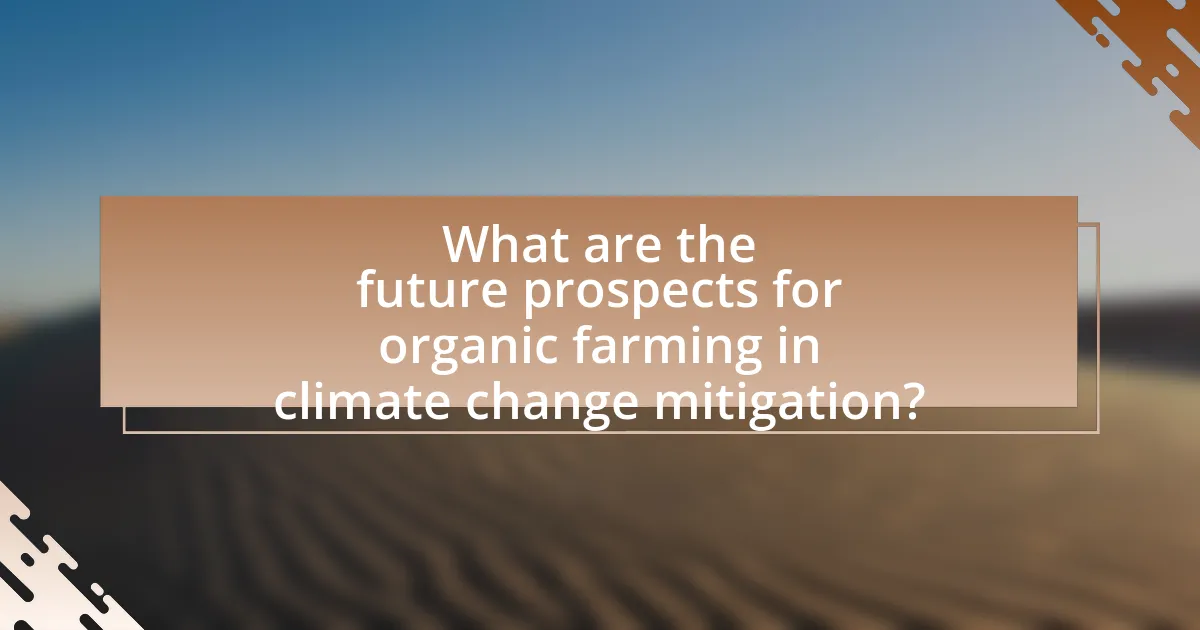
What are the future prospects for organic farming in climate change mitigation?
The future prospects for organic farming in climate change mitigation are promising, as it enhances soil health, reduces greenhouse gas emissions, and promotes biodiversity. Organic farming practices, such as crop rotation and cover cropping, improve soil carbon sequestration, which is crucial for mitigating climate change. Research indicates that organic farming can sequester up to 30% more carbon in the soil compared to conventional methods. Additionally, organic systems typically use fewer synthetic fertilizers and pesticides, which contribute to lower emissions of nitrous oxide, a potent greenhouse gas. The increasing consumer demand for organic products further supports the expansion of organic farming, making it a viable strategy for addressing climate change challenges.
How can education and awareness enhance the role of organic farming?
Education and awareness can significantly enhance the role of organic farming by equipping farmers and consumers with knowledge about sustainable practices and the environmental benefits of organic methods. When farmers are educated about organic farming techniques, such as crop rotation, composting, and natural pest control, they can improve soil health and biodiversity, which are crucial for climate change mitigation. Research indicates that organic farming can sequester more carbon in the soil compared to conventional methods, thereby reducing greenhouse gas emissions. Furthermore, increased consumer awareness about the benefits of organic products can drive demand, encouraging more farmers to adopt organic practices. A study published in the journal “Agriculture, Ecosystems & Environment” found that consumer education campaigns can lead to a 20% increase in organic product sales, further promoting sustainable agricultural practices.
What initiatives are in place to promote organic farming practices?
Various initiatives are in place to promote organic farming practices, including government subsidies, certification programs, and educational outreach. For instance, the USDA’s National Organic Program provides a framework for organic certification, ensuring that farmers adhere to specific standards. Additionally, many countries offer financial incentives to farmers transitioning to organic methods, which can include grants and low-interest loans. Educational programs, such as workshops and online courses, help farmers learn about organic practices and sustainable agriculture techniques. These initiatives collectively aim to increase the adoption of organic farming, contributing to climate change mitigation by promoting biodiversity and reducing chemical inputs.
How can consumers influence the growth of organic farming for climate benefits?
Consumers can influence the growth of organic farming for climate benefits by increasing demand for organic products, which encourages farmers to adopt organic practices. When consumers choose organic foods, they support agricultural methods that reduce chemical inputs, enhance biodiversity, and improve soil health, all of which contribute to lower greenhouse gas emissions. According to the Research Institute of Organic Agriculture, organic farming can sequester up to 30% more carbon in the soil compared to conventional methods. By prioritizing organic purchases, consumers signal to the market the importance of sustainable practices, thereby driving more farmers to transition to organic farming, ultimately benefiting the climate.
What practical steps can farmers take to implement organic farming for climate change mitigation?
Farmers can implement organic farming for climate change mitigation by adopting practices such as crop rotation, cover cropping, and composting. Crop rotation enhances soil health and reduces pest pressure, which can lead to lower chemical inputs and improved biodiversity. Cover cropping prevents soil erosion, enhances soil organic matter, and sequesters carbon, contributing to reduced greenhouse gas emissions. Composting recycles organic waste into nutrient-rich soil amendments, promoting soil fertility and reducing reliance on synthetic fertilizers. According to the Food and Agriculture Organization, organic farming can sequester up to 1.5 billion tons of carbon dioxide equivalent annually, demonstrating its potential impact on climate change mitigation.
What are the best practices for transitioning to organic farming?
The best practices for transitioning to organic farming include conducting a thorough soil health assessment, implementing crop rotation, and utilizing organic pest management strategies. Soil health assessments help identify nutrient levels and microbial activity, which are crucial for organic farming success. Crop rotation enhances soil fertility and disrupts pest cycles, reducing the need for chemical inputs. Organic pest management strategies, such as introducing beneficial insects and using natural repellents, minimize reliance on synthetic pesticides. Research indicates that farms practicing these methods can improve biodiversity and soil carbon sequestration, contributing to climate change mitigation.
How can farmers measure the impact of their organic practices on climate change?
Farmers can measure the impact of their organic practices on climate change by utilizing carbon footprint assessments and soil health evaluations. These methods allow farmers to quantify greenhouse gas emissions reductions and improvements in soil carbon sequestration associated with organic farming techniques. For instance, a study published in the journal “Agriculture, Ecosystems & Environment” found that organic farming can sequester up to 30% more carbon in the soil compared to conventional methods, demonstrating a significant positive impact on climate change mitigation. Additionally, farmers can employ tools like life cycle assessments (LCA) to analyze the environmental impacts of their practices throughout the production process, providing a comprehensive view of their contributions to reducing climate change.
